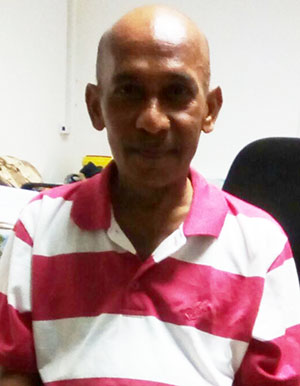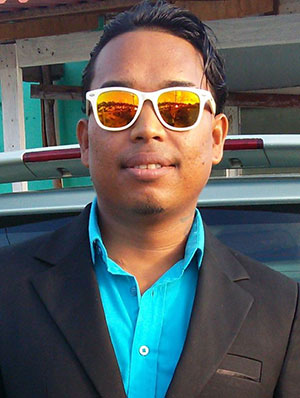– a blessing for GPHC’s patients unable to finance life-changing surgery
By Ravena Gildharie
THE first kidney transplant surgery ever conducted in Guyana occurred in 2008, but it wasn’t until 2014, that the state-owned Georgetown Public Hospital Corporation (GPHC) started offering the surgery. Free of cost, it reaches persons previously unable to finance

such expensive treatment at private and overseas facilities. Many local kidney failure patients die while still gathering funds for transplant surgery.
So, for those that have benefitted, the transplant is a chance of survival. But how different are their lives now? And how have they been spending their time since getting a new kidney, and a new lease on life? And what of their donors; the selfless relatives who willingly give up their organs?
Ellisya Persaud, age 21, of Henrietta, Essequibo Coast, was forced to drop out of the Cyril Potter College of Education (CPCE) when she was diagnosed with kidney failure in October 2014. She was coughing up blood then and endured extended bouts of vomiting and diarrhea. Her blood pressure skyrocketed and her sight became impaired. She required dialysis three times per week, which left her weak and she was unable to return home to Essequibo. She was hospitalised several times; in one instance, for two months.
Now, it has been five months since Persaud underwent kidney transplant and she is already pursing business and computer science studies, as she aims to fulfill her dreams of becoming an educator. Her older brother, Romaul, was the donor and he has since returned to work and is living a normal healthy life.

“My life is so much better now. No more dialysis and I feel healthier and more alive. Now I can get to move on with life plans. After my studies, I hope to return to my home in Essequibo,” Persaud told the Pepperpot Magazine in a recent interview. She is still required to take medications three times per day, undergo blood tests and medical assessments every two weeks, but so far, her body has responded well to the transplanted kidney.
“Transplant makes a very big difference in the lives of patients suffering from kidney failure. They get to live a healthier life, there are minimal diet restrictions; they get to go back to work, back to school and there is no need for blood transfusion,” said GPHC’s Transplant Surgeon, Dr Kishore Persaud, who heads the institution’s Nephrology Department. He teams up with local doctors and others from Canada and the United States to perform the transplants. The overseas surgeons visit twice yearly to perform the surgeries.
Each year, the GPHC sees about 40-50 patients who require kidney transplants, Dr Persaud said, adding that this number includes referrals from outlying hospitals. He manages these

patients, many of whom require frequent hospitalisations for lengthy periods, and this sometimes contributes to overcrowding. Also, dialysis which patients rely on for survival, is costly for the average Guyanese household.
“Dialysis costs about $15, 000 per session and with each patient requiring about three sessions per week, that equates to $45, 000 per week and ultimately $180, 000 per month which is beyond the average income of most Guyanese. So financially, transplant is a more cost-effective treatment,” Dr Persaud outlined. Dialysis at the GPHC is only offered to hospitalised patients as capacity is limited.
Dr Persaud was trained in organ harvesting and transplant in Canada, and to date, is the only trained medical personnel in this field operating in the public health system. The GPHC Nephrology Department has three General Medical Officers (GMO), one dietician and one social worker.
Reintegrating in society
Tomol Mingo, age 16, a student of the Charlestown Secondary School is one of the youngest patients that has benefited from transplant surgery. Last February, he received a kidney from his mother, Shondelle Mingo, who works at the Ministry of Public Infrastructure.
Before being diagnosed with kidney failure in January 2016, the young man had been a promising footballer and was awarded many prizes, trophies and medals in prominent competitions such as the Digicel Schools Championship and Milo Secondary Schools Tournament. But in the last year, he was snatched from the fields and hardly able to attend school. He felt unwell, depended on three sessions of dialysis per week and lost vision in one of his eyes.
“He spent the last year in and out of hospital…I can’t even remember exactly how many times he was hospitalised but more than 10, I think. He vomited terribly, felt weak and had severe headaches. His blood pressure was always high and it was painful to see him like that,” recalled Tomol’s mom. It was a heavy financial burden on the family too, with Tomol being the eldest of five children, and his father’s fluctuating income as a mason/carpenter. Shondelle relied on donors and the Guyana government to help offset expenses particularly the dialysis.
“I am very grateful to Dr Kishore Persaud who really helped us a lot…Without his help, I don’t know what would have happened. Dr Persaud was the shining light in our cloud of darkness,” she expressed.
After surgery, Tomol returned to school in March and did extremely well in the most recent end-of-term examinations. He is headed into Fifth Form where he will begin preparing to sit the Caribbean Secondary Education Certificate exams next year. He also returned to playing football and helps to coach other students.
Overall, Tomol is feeling better and the family is at ease. The mother also recovered well from the donor surgery and has not had any complications thus far.
Like Mingo, 28-year-old Kiran Brian Hardyal of Wallers Delight, West Coast Demerara, (WCD) has been gradually restoring normalcy in his life since undergoing kidney transplant two years ago. He recalled the agony of living with “constant excruciating headaches”, high blood pressure, feeling of weakness, nausea and swollen feet. His frequent dialysis treatments also left him confined to his home, unable to work or travel.
“Sleeping was a bit of a challenge too because of the catheter sticking out of my stomach,” he said. “Being on dialysis was a daily challenge, but it was necessary to stay alive.”
High regards for donor
After being quoted a price of some $7 million for kidney transplant surgery at a private hospital, Hardyal was heartbroken since he could not afford it. His hopes grew when he met Dr Persaud and was offered the surgery at GPHC free of cost. Hardyal and his donor, Satyam Inardeo, a relative, both prepared for their surgeries with a series of blood tests, clinical assessments, counselling and necessary paperwork.
“I immediately felt different when I woke up from surgery. My recovery was really good, I started eating back and drinking water as normal,” Hardyal stated.
He added, “My life now is totally different. I’m back to normal, no dialysis, I’m free to travel anywhere, and I have no more sleepless nights. I have more energy than before. Having a transplanted kidney is like having a new life and my donor is doing well. She is living her normal life…Not everyone is lucky as I was to have a donor. She willingly gifted me a second chance at life. She has given me something I can’t repay but I will forever regard her as my mother,” the young man said.
Another grateful kidney transplant patient is 53-year-old Abdool Shakeer of Diamond, East Bank Demerara. Last February, he received a kidney from his son, Imran, age 28, and is still at home recovering. An Assistant Factory Manager at Beharry Group of Companies, the elder Shekeer collapsed at work one year ago and was rushed to the hospital, where he was diagnosed with kidney failure after a series of tests. Boasting 36 years of exemplary service to his employer, Shakeer spent the last year on dialysis twice weekly, which left him weak and caused him to miss work a lot.
Currently resting at home and regaining his strength, Shakeer looks forward to returning to work within the next several months. He enjoys eating any food he wishes, something he was restricted from doing before the transplant. And his donor, is also healthy and back to his normal lifestyle.



.jpg)








